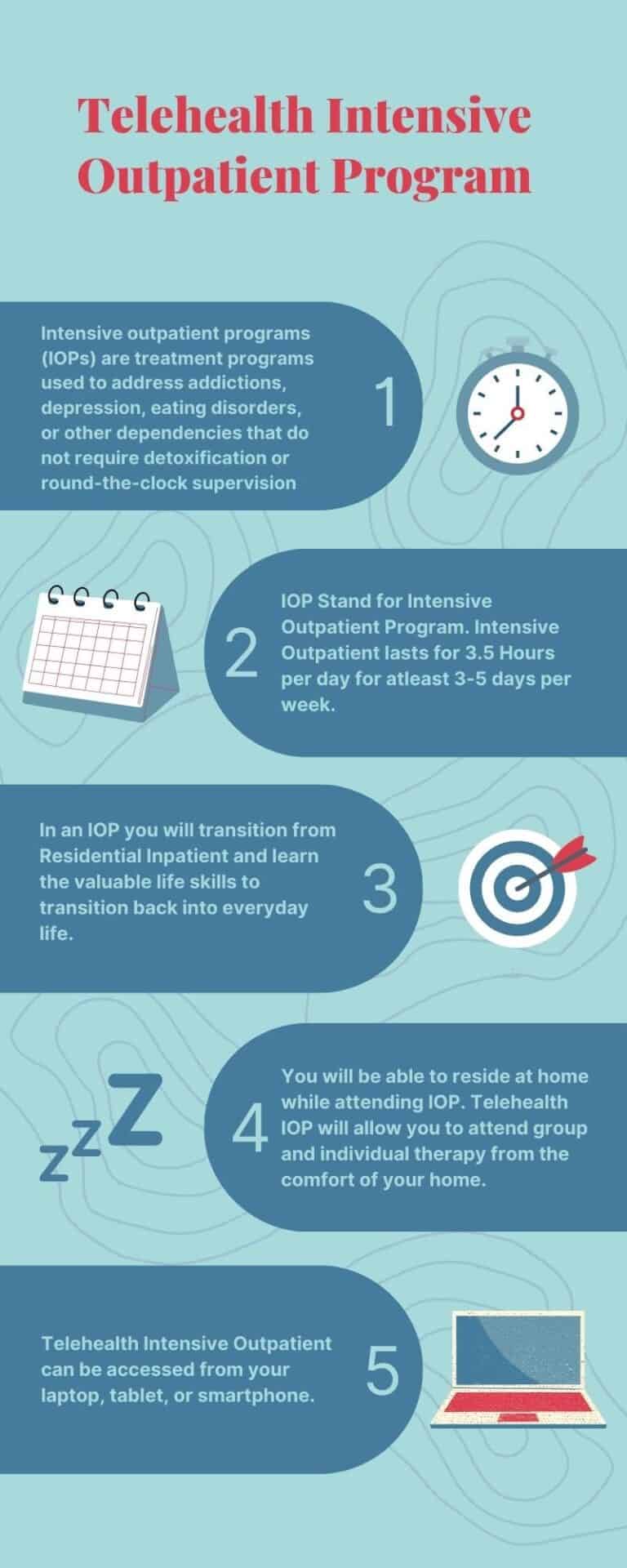Expert Tips for Discovering the Best Intensive Outpatient Program (IOP).
Expert Tips for Discovering the Best Intensive Outpatient Program (IOP).
Blog Article
Browsing the Intricacies of Double Diagnosis Treatment Within an Extensive Outpatient Program Establishing
In the realm of psychological wellness and addiction treatment, the crossway of double diagnosis offers a nuanced challenge that requires a detailed and customized approach. Within the boundaries of an Intensive Outpatient Program (IOP) setting, the complexities of resolving co-occurring mental wellness problems and compound use problems call for a delicate balance of proficiency and resources to navigate. The combination of evidence-based practices, joint efforts amongst multidisciplinary groups, and a keen understanding of the special requirements of each person are important components in successfully managing twin medical diagnosis within an IOP structure. By exploring the complexities of dual medical diagnosis therapy within this intensive outpatient context, a more clear course emerges towards holistic and sustainable recuperation for those facing these linked obstacles.
Twin Medical Diagnosis Summary
What is the significance of comprehending twin diagnosis in mental health therapy? Double diagnosis describes the co-occurrence of a compound usage problem and a mental health problem in an individual. It is vital to identify and address this comorbidity as it can significantly affect the effectiveness of psychological health and wellness treatment. Without appropriate identification and management of both conditions, people may have a hard time to achieve long-term recovery and stability.
Comprehending double medical diagnosis is essential as it requires a thorough and incorporated approach to therapy. By recognizing the interaction in between material use and mental wellness, doctor can customize interventions to fulfill the distinct needs of each person. This holistic approach not just addresses symptoms but additionally targets hidden factors that add to the double medical diagnosis.
Moreover, untreated double medical diagnosis can cause a cycle of regression and getting worse mental health signs and symptoms. By recognizing the complexity of twin medical diagnosis and providing specific treatment, medical care experts can support individuals in achieving lasting recovery and boosted mental health.
Tailored Therapy Plans
Acknowledging the intricate interplay between compound use disorders and mental wellness problems, the development of customized therapy plans is vital in dealing with the complexities of twin medical diagnosis in psychological wellness therapy. Customized treatment strategies are customized techniques that think about the special needs, challenges, and goals of individuals encountering double medical diagnosis. These strategies are created collaboratively by a multidisciplinary group of professionals, including psychiatrists, psychologists, social workers, and dependency experts, to ensure extensive and incorporated treatment.
Tailored treatment plans usually involve a mix of treatments, drugs, and behavior treatments that target both the compound usage condition and the mental health condition concurrently. These strategies may include cognitive-behavioral treatment, dialectical behavior modification, medication-assisted therapy, private therapy, team therapy, and family members treatment, amongst various other evidence-based interventions. By personalizing treatment methods to individual circumstances, tailored plans can deal with the source of double medical diagnosis, advertise long-term healing, and improve overall lifestyle for people dealing with co-occurring disorders.
Integrated Treatment Method

By incorporating social interventions like household therapy, employment assistance, and area resources, the therapy ends up being extra all natural and tailored to the individual's certain requirements. On the whole, an incorporated care approach in double medical diagnosis treatment within an extensive outpatient program setup intends to provide comprehensive, reliable, and individualized treatment to individuals encountering co-occurring problems (Intensive Outpatient Program (IOP)).
Obstacles in IOP Setting
In the context of double medical diagnosis therapy within an extensive outpatient program, browsing the complexities of co-occurring compound use disorders and psychological health problems offers substantial difficulties. Among the primary obstacles in the IOP setting is the control of treatment in between mental health specialists and drug abuse experts to make certain an extensive treatment approach. This requires reliable interaction, cooperation, and a deep understanding of exactly how these problems engage and affect each various other.
In addition, the ever-changing nature of compound usage disorders and psychological health conditions includes an additional layer of complexity - Intensive Outpatient Program (IOP). Customers in an IOP may experience unexpected changes in their find more information symptoms or compound food cravings, calling for timely treatment and adjustment of therapy methods. Balancing the strength of treatment and assistance while allowing customers the adaptability to handle their everyday duties can be a delicate equilibrium to keep
Additionally, attending to stigma and resistance to therapy within the IOP setup can restrain development. Some people may be hesitant to reveal their dual medical diagnosis or might really feel ashamed, hindering their engagement in the therapeutic process. Conquering these barriers demands a supportive and non-judgmental setting that fosters depend on and visibility.

Collaborative Specialist Efforts

Joint initiatives additionally expand to routine communication and information sharing among group participants to guarantee a cohesive therapy approach. Eventually, a joined front of experts functioning with each other improves the performance of double medical diagnosis treatment within an intensive outpatient program.
Conclusion
In conclusion, reliable double medical diagnosis therapy within an intensive outpatient program setting calls for tailored therapy strategies and an incorporated care strategy. Obstacles may arise in this setup, but collaborative efforts among professionals can assist navigate these intricacies. By addressing the distinct needs of individuals with co-occurring psychological wellness and compound use conditions, IOP programs can offer thorough and holistic treatment to support recuperation and general health.
Report this page